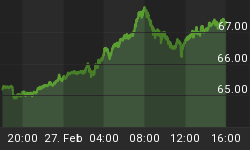Before blaming falling stocks on the most recent weak economic reports, let's check some dates
As of June 10, the Dow has suffered the "longest losing streak since the fall of 2002. The market's last seven-week stretch of losses began in May 2001, as the dot-com bubble deflated," reports The Associated Press.
As for why stocks are falling, most observers agree: Blame "weaker hiring, industrial output, and a moribund housing market." The economic reports from the past two weeks made that clear.
But wait a minute. The DJIA didn't top in the past two weeks -- it topped on April 29. At the time:
- U.S. unemployment benefit applications had been trending down/flattening. In fact, "The unemployment rate fell last month in more than 80% of the nation's largest metro areas," said an April 27 AP report.
- U.S. industrial output was up. In fact, "both the Philly and N.Y. Fed reports show[ed] improving manufacturing and business conditions." (Reuters, April 15)
- As for the U.S. housing market, it officially entered the "double-dip recession" zone only on May 31, a month after the Dow's April 29 peak.
This is not to say that unemployment, manufacturing and real estate were peachy in April. But the worst of the reports from those areas of the economy only came after the stock market had already entered the decline. The most recent weak economic reports hardly explain why stocks topped when they did.
If you're looking for a better explanation, consider an Elliott wave perspective: The economy doesn't lead the stock market -- it's the stock market that leads the economy.
Skeptical? Then think back to 2007. "Goldilocks economy," strong corporate earnings, unemployment at 4.4% -- nothing but blue skies ahead. The Dow rallies to an all-time high above 14,000 in October 2007 -- and over the next 18 months goes on its biggest losing streak in 70+ years, falling 54% and ushering in "the Great Recession."
Now fast forward to March 2009. The Dow has crashed below 6,500; unemployment has more than doubled; the desperate Fed has dropped interest rates to 0%; foreclosures; bailouts; consumer confidence at an all-time low; general state of near-panic. The Dow bottoms on March 6, 2009, and stages a powerful two-year rally above 12,000.
By conventional logic, you'd have to agree that, paradoxically, "the good economy" of 2007 prompted the deflationary crash, while "the bad economy" of 2009 sent stocks flying.
But here's an explanation that actually makes sense: Broad market trends are not created by the economic conditions -- social mood is what creates them. Social mood doesn't depend on what Ben Bernanke had for breakfast -- it changes for endogenous reasons, and those changes follow the Elliott wave model. Stocks lead the economy because they are quicker to register changes in social mood.
Before you make investment decisions based on the latest economic report, be sure to read the 2011 edition of The Independent Investor eBook by Elliott Wave International. You will see example after example of the fallacy to the belief that economic conditions direct the moves in the stock market. Download your free 50-page Independent Investor eBook now.
This article was syndicated by Elliott Wave International and was originally published under the headline Six Straight Weeks of Decline Take DJIA Below 12,000: What Now?. EWI is the world's largest market forecasting firm. Its staff of full-time analysts led by Chartered Market Technician Robert Prechter provides 24-hour-a-day market analysis to institutional and private investors around the world.















